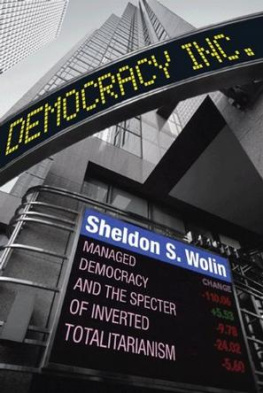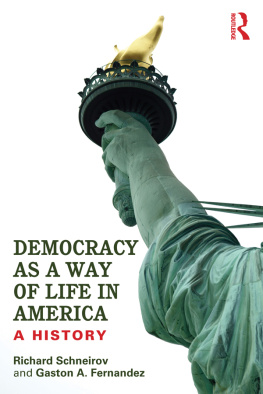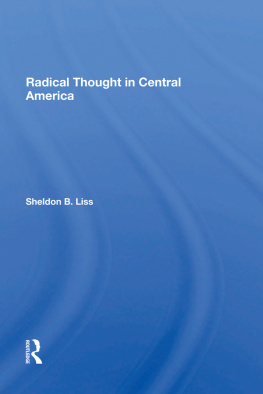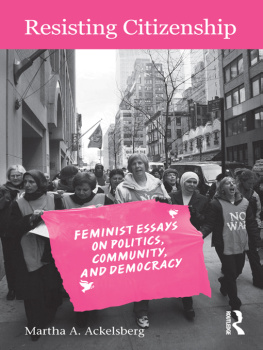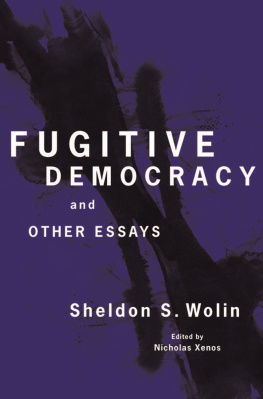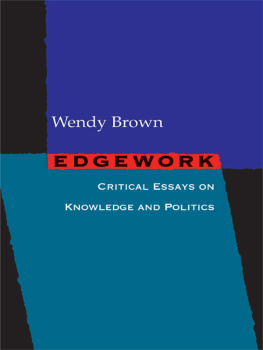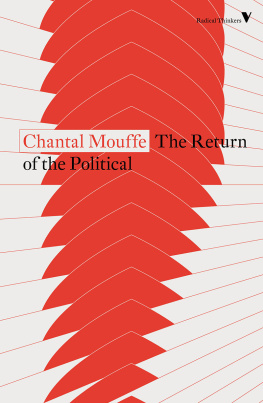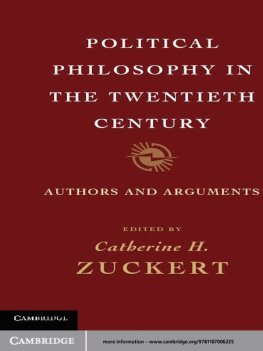FUGITIVE
DEMOCRACY
FUGITIVE
DEMOCRACY
and
OTHER ESSAYS
Sheldon S. Wolin
Edited by
Nicholas Xenos
PRINCETON UNIVERSITY PRESS
PRINCETON AND OXFORD
Copyright 2016 by Princeton University Press
Published by Princeton University Press, 41 William Street, Princeton, New Jersey 08540
In the United Kingdom: Princeton University Press, 6 Oxford Street, Woodstock, Oxfordshire OX20 1TR
press.princeton.edu
Jacket art courtesy of Shutterstock
The Destructive Sixties and Postmodern Conservatism by Sheldon Wolin, from Reassessing The Sixties: Debating the Political and Cultural Legacy, edited by Stephen Macedo. Copyright 1997 by W. W. Norton & Company, Inc. Used by permission of W. W. Norton & Company, Inc.
All Rights Reserved
Library of Congress Cataloging-in-Publication Data
Names: Wolin, Sheldon S., author. | Xenos, Nicholas, 1948- editor.
Title: Fugitive democracy : and other essays / Sheldon S. Wolin ; edited by Nicholas Xenos.
Description: Princeton, New Jersey : Princeton University Press, 2016. | Includes bibliographical references and index.
Identifiers: LCCN 2016007796 | ISBN 9780691133645 (hardback)
Subjects: LCSH: DemocracyPhilosophy. | Political sciencePhilosophy. | BISAC: POLITICAL SCIENCE / History & Theory. | POLITICAL SCIENCE / Essays. | POLITICAL SCIENCE / Civics & Citizenship.
Classification: LCC JC423 .W57 2016 | DDC 321.8dc23
LC record available at https://lccn.loc.gov/2016007796
British Library Cataloging-in-Publication Data is available
This book has been composed in Minion Pro and News Gothic Std
Printed on acid-free paper.
Printed in the United States of America
10 9 8 7 6 5 4 3 2 1
CONTENTS
FOREWORD
IN REVISITING THESE ESSAYS I was struck by the contrast between, on the one hand, the individual theorists singled out for extended discussion and, on the other, my preoccupation with democracy. All of these writers are widely recognized as possessing exceptional, superior minds, able to illuminate the concrete by the abstract, the particular by the systematic. In the extraordinary abilities that set them apart they might be said to constitute an elite. Not coincidentally, their views are in varying degrees either critical of democracy (e.g., Hobbes, Weber), or suspicious (Horkheimer and Adorno), wary (Arendt), or qualified (Marx, Rawls). And, with the exception of Rawls, all were in varying degrees sympathetic to some form of elitism.
Is there an inherent antagonism between the individualism of theory and the commonality of democracy? Should the democrat be suspicious of the theorist, especially when the latter professes to be a democratic theorist? A self-described democratic theorist who set out to prescribe the proper form of a democracy; or the essential democratic institutions; or the policies, foreign and domestic, which ought properly to follow might be said to be practicing a version of Rousseaus Great Lawgiver, the inspired one who makes a gift of a comprehensive set of prescriptions for setting the fundamental principles and practices which the society and its members ought to follow. While such a conception of theory contradicts the point of self-government, it also replicates the historical experience of the so-called founding of the American political system. Although Americans are taught that unlike socialist or communist societies, our politics is pragmatic and antitheoretical (= nonideological) the historical actuality is that American politics has been shaped primarily by a constitution that was intended by its framers to embody a theory, an abstract formula for creating a new reality, a certain type of government, a republic, by which the Few could govern the Many while allowing the latter a degree of inclusion (e.g., male whites could vote for the House of Representatives). Perhaps the vaunted American exceptionalism might be a reflection of the triumph of theory rather than the beginnings of a democracy.
The principal reason for the bias against democracy, and for the presence of elitist tendencies among the twentieth-century thinkers represented here, was the threat believed to be posed by the modern phenomenon of mass society and its alleged complicity to the rise of totalitarian dictatorships. The mass was perceived as irrational, resentful, credulous, manipulable, suspicious of all forms of superiority and difference, and highly susceptible to demagoguery. It was not unusual for intellectuals to characterize the mass as unthinking, hence their natural enemy, the intellects other.
Arguably mass tendencies do exist today in the United States: in the culture of consumption, in the media conglomerates producing popular entertainment and slanted news, and in an increasingly manipulative electoral politics where hot button issues (e.g., anti-abortion, anti-immigration) are programmed to elicit the desired reflexes from voters. Above all and especially at election time or in moments of national crisis, a mass is fashioned that is responsive to uncritical forms of patriotism, nationalism, and religiosity.
Considered in the abstract, certain ideas conventionally associated with democracy, such as majority rule, popular sovereignty, and equality, might seem to share a kinship with massiness and its connotation of mere undifferentiated numbers and its menace of aggregated power. But thanks to the strategies that have shaped mass consumption and its culture, as well as the electoral and lobbying systems, massiness is now less a menace than a domesticated subject. Long before modern sociologists discovered the mass, our Founding Fathers had anticipated the problem and designed a governmental system to filter, check, and balance any tendencies toward expressing the industrious and uninformed mass of the people (James Madison). Thus the constitutions guarded view of democracy was not only a theoretical and a political achievement, but the perpetuation of the antagonism between theory and democracy that is as old as Platos Republic.
Paradoxically, despite the successful construction and marketing of sameness, ours is also a society driven by growing and increasingly sharp differences reflective of inequalities of wealth, education, and life prospects. These inequalities are not celebrated, for that would be an affront to democratic sentimentalism. However, other types of inequality have been both celebrated and deplored: various and intense allegiances to race, or gender, or ethnicity or sexual orientation, or religious beliefs, each united by difference and protest against the corresponding forms of discriminatory treatment. The consequence is that in arousing and organizing these separate and distinct forms of group-consciousness, elites have made it politically more difficult to form majorities that are both effective and legitimating.
The fact that the politics of difference is primarily the achievement of elites, many of whose members are academics, has contributed to the growing tendency in public discussions by both liberals and conservatives to accept elitism as normal in all areas of society and tacitly to legitimate it. This despite the fact that historically, more often than not, apologists for elitism have consistently rejected democracy and depicted elitism as its natural opponent. The ultimate irony was that the administration of George W. Bush, arguably the most antidemocratic and openly elitist since the preCivil War era, proclaimed the United States the worlds foremost exemplar of democracy and proceeded to prove the point by imposing democracy in Iraq.
Elitism is the claim that special skills are required to operate the major institutions of society and to articulate and represent coherent diversities. These skills are described as demanding and uncommon, hence unattainable except by the few. The production of elites is the business of various institutions whose hallmark is certification through competitiveness and proper grooming. These include law, business, journalism, and graduate schools; the marketplace for competing goods, ideas, and investment; corporate institutions; and the apparatuses of the major parties (internships). The fact that the politics of difference has been primarily the achievement of ideological elites has contributed to the growing tendency in public discourse both in the popular media and more elevated journals of opinion, liberal as well as conservative, to accept elitism as normal in all areas of society and tacitly to legitimate it, even though, historically, elitism has, more often than not, been a persistent opponent of democracy. Hence the incongruity of a public ideology that proclaims the United States is the exemplar of democracy and an actual politics and governance dominated by elites.
Next page

